Media Lens recently explored the UK media reaction to news of Julian Assange’s bid for asylum in Ecuador. Their Alert exposed an embarrassing example of groupthink among an already visibly introverted Twitter clique, comprised of an array of liberal journalists from the country’s respected broadsheets.
In their haste to “groan with each fresh turn of the story” (as the Guardian’s readers editor described the prerogative of Assange’s detractors) few journalists bothered to address the substantive issue of the threat of extradition to the US. They instead framed the asylum bid as a ploy to avoid questioning over sexual assault allegations in Sweden.
Rather than a ‘groan’ this ‘fresh turn’ triggered an avalanche of abuse and ridicule directed at Assange, with journalists attempting to out do one another in a show of radical on-message-ism.
The lurid nature of the commentary cited in the Media Lens Alert stands in stark contrast to the professional hesitancy typically displayed in print, and perhaps hints at what lies between those carefully crafted lines. These interactions are more suggestive of private exchanges between colleagues at the proverbial water cooler, dominated by fact free or counter-factual mockery. Bluntly referencing the antagonistic history that has been the relationship between Assange and the British press.
“Comment is free…but facts are sacred” proclaims the headline banner on the Guardian’s comment pages, yet in this particular case, they were conspicuous by their absence.
Even George Monbiot, a journalist who is well known for meticulous footnoting, demanded only a cursory review of whatever evidence his Twitter followers put in front of him before passing judgement. A method of investigation potentially hampered by his habit of ‘blocking’ people who disagree with him, MediaBite included.
A perspective which just so happens to comfortably align with that of his editor-in-chief:
“the Guardian’s editor-in-chief, still supports many of the principles of WikiLeaks and would support Assange in any attempt by the US to extradite him over the release of the cables”
But it would be unfair not to mention those instances where journalists attempted to back up the vitriol with those ‘sacred facts’. New Statesmen writer David Allen Green made numerous threats to outline the legal thesis that undermined Assange’s fears of extradition to the US, however they came to nothing. His hastily penned blog published soon after Wikileaks’ Twitter account announced Assange’s arrival at the Ecuadorian embassy constituted his singular offering to the New Statesman’s readers, reflecting closely the tone of his tweets on the subject:
[Source: Tweet since deleted]
“It appears to me that Assange’s ploy is just another desperate stunt to frustrate and circumvent due process for investigating these allegations.” [David Allen Green, New Statesman, 19/06/12]
In the end it was left to the Guardian’s Nick Cohen to step up to the plate. Cohen, a liberal apostate (think Hitchens without the conviction), who threw his reputation on the bonfire that was Tony Blair’s invasion of Iraq, is highly regarded in the British press and his piece on Assange was well received by colleagues:
However, there were gaping holes in his argument, which relied on a (perhaps purposefully) farcical understanding of US politics and law. His article was all the more strained by the simply ridiculous attempts to denigrate advocates of opposing positions, such as Salon journalist Glenn Greenwald, who Cohen referred to as Glenn Beck’s “mirror image on the American left”. Cohen wrote:
“American democracy is guilty of many crimes and corruptions. But the First Amendment to the US constitution is the finest defence of freedom of speech yet written. The American Civil Liberties Union thinks it would be unconstitutional for a judge to punish Assange.” [Nick Cohen, The Guardian, 24/06/12]
A day later Forbes contributor, Mark Adomanis, described Cohen’s grasp on US law and its relationship with politics and power:
“How is it possible for anyone, let alone a someone who is employed as a professional political commentator, to think that the ACLU’s opinion carries any weight whatsoever? How shockingly naive or uninformed do you have to be to think that Obama, or anyone else of consequence in Washington, gives a half a whit about the ACLU?
Will Julian Assange be tried by the US government? I don’t know, and neither does Nick Cohen. But what I do know, what should be quite obvious, is that the ACLU’s opinion on the constitutionality of such a prosecution is about as relevant to whether or not it will occur as the price of fish food in Seattle, traffic conditions in Vienna, or Cliff Lee’s WHIP.” [Mark Adomanis, Forbes, 25/06/12]
Confronted with this pretty damning assessment, Guardian journalist and former Wikileaker James Ball responded:
[Source]
Facts are clearly not sacred when it comes to certain issues and certain people.
Two days later, a funny thing happened. We were provided a perfect case study for comparison. The owner of the London Evening Standard, a free sheet masquerading as a serious paper (where ‘upskirt’ photographs of female celebrities sit alongside reports of British soldiers killed in Afghanistan), announced that former British Prime Minister and co-architect of the Iraq war would take the reigns as editor for the day.
The reaction on the floor of the Evening Standard was much the same:
Prompting a backlash on Twitter, with users supporting the #BinBlair hashtag:
But Lebedev’s adviser, Amol Rajan, who is also a journalist with Independent, was more than happy to defend the decision:
Among the journalist Twitter clique that attacked Assange though, gone was the vitriolic one-up-man-ship, gone were the supportive ‘re-tweets’ and nowhere to be seen were the rash blog posts deriding Blair for his alleged crimes. Channel 4 news’ Alex Thompson was one of the few who took to Twitter to point out the bitter irony of Blair becoming editor of the fourth estate:
George Monbiot also found a moment to criticise Blair’s return:
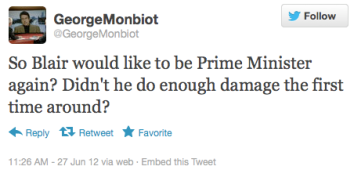
But Monbiot found no time to chide the Evening Standard or for that matter his own paper, the Guardian, whose editorial entertained a new era of Blair on the back of his editorial debut:
“John Major likened Blair’s long goodbye to Nellie Melba; the coming comeback must show he is more like Sinatra and Elvis” [Editorial, The Guardain, 29/06/12]
Is this the same Monbiot who challenged us to attempt “a peaceful citizen’s arrest of the former British prime minister, Tony Blair, for crimes against peace“?
The context of Blair’s return to the spotlight is equally if not far more controversial than that of Assange. It is only weeks since Blair was questioned by the Leveson Inquiry, a process instigated in part by the Guardian’s investigation of News International’s phone hacking, about his relationship with Rupert Murdoch.
As a major player in the media market the owner of the London Evening Standard also testified at the inquiry. He described how newspaper owners deserve access to politicians.
A position made more interesting when you put it in the context that his father, Alexander Lebedev, admitted the paper was always intended to be a loss making exercise.
“As far as I’m concerned this [buying the Standard] has nothing to do with making money. There are lots of other ways. This is a good way to waste money” [Luke Harding and Mark Sweney, The Guardian, 14/01/09]
And we now we have Tony Blair brought inside the paper as some sort of PR stunt to support his planned re-entry into politics. A return the Guardian then devotes a soft “like him or loathe him” editorial to. And only a handful of the uninhibited journalists who had their go at Assange days earlier voiced concern at a rival newspaper bringing in a man accused of war crimes as editor for a day.
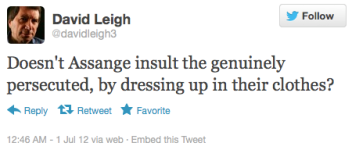
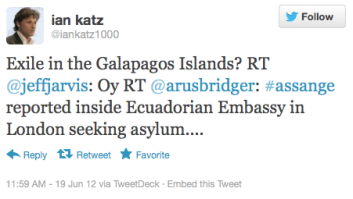
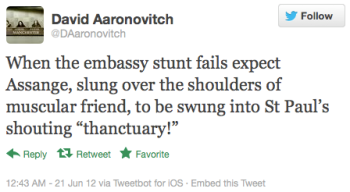
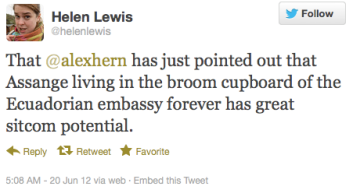
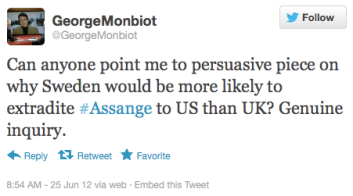
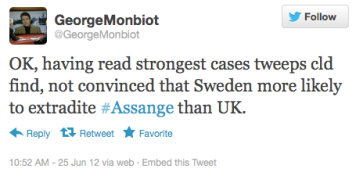
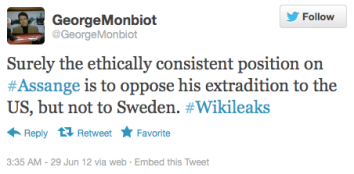
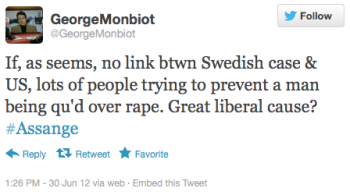

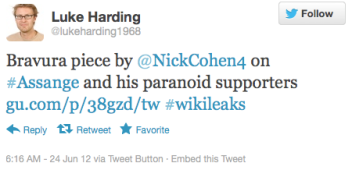
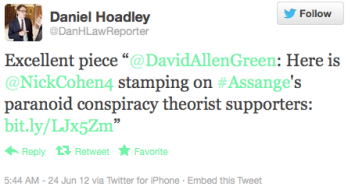
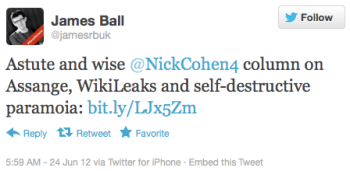
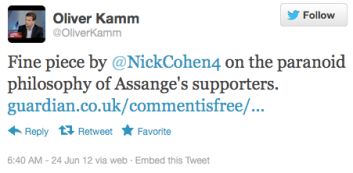
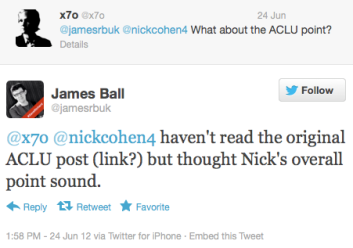
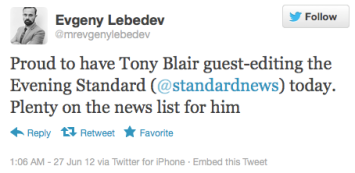
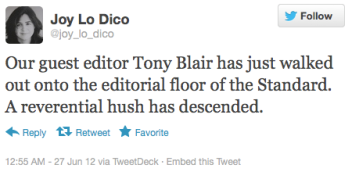
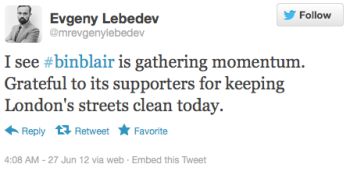
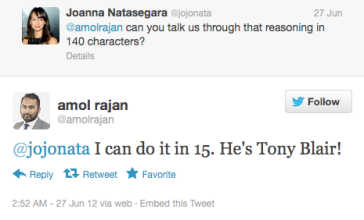

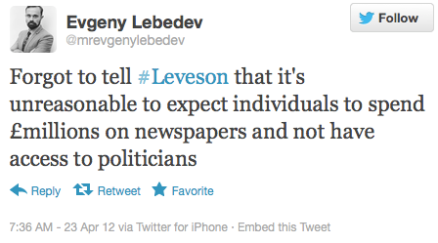
Reblogged this on NonviolentConflict.
Typo – “degenerate” should be “denigrate”
The ‘opinion-formers’ marching in lock-step. Telling.
The Cohen/ACLU thing is astonishing. Greenwald’s crime is to have subjected Obama’s WH to the same forensic examination that he applied to that of GWB. He’s an absolute beacon of non-partisan sanity on what has unfolded in terms of US foreign policy / Wikileaks / Bradley Manning, etc.
http://www.salon.com/writer/glenn_greenwald/
Actually, rather than call Greenwald the ‘mirror-image of Glenn Beck’ it’d be more accurate to describe him as the ‘anti-Nick Cohen’.
This is an excellent report on the UK’s smug media frathouse. I have previously documented the Guardian’s vendetta against Assange here:
http://wlcentral.org/node/2363
I’ve personally been blocked by a dozen Guardian journos just for politely asking them to face facts:
http://jaraparilla.blogspot.com.au/2012/01/how-to-get-blocked-by-los-del-guardian.html
I have a complaint lodged with the UK Press Complaints Commission now under consideration. I suggest others do the same:
http://jaraparilla.blogspot.com.au/2012/06/letter-to-uk-press-complaints.html
Gary Lord
@Jaraparilla
Thanks Kingfelix and gazo.
Greenwald is good and I think this episode has given him pause for thought re the UK press. Up until know he has been defensive of them and constantly praising the Guardian.
Guardian journos, led by Rusbridger and Leigh, have been the most vocal and irrational critiques of Assange.
That was an appalling article, really. The more I read the more disdain I felt for more people. I don’t know what I dislike most their pathetic attempts at wit and humour, seems ghastly middle class undergraduate style to me, or their complete lack of focus on the facts in the Assange affair. To be honest they are hopeless.
I’ve had run-ins with The Guardian, the Independent, the New Statesman years ago over Assange and in the beginning I assumed they were merely getting the story wrong, factually wrong, due to ignorance or lack of intelligence; but I was mistaken. It was far worse. One can forgive someone for not knowing something, but when the keep writing the same shit after they’ve been informed where they’ve gone wrong, one concludes that they don’t give a fuck about the facts but have a completely different agenda. They want to see Assange nailed!
As I’ve lived in Sweden and know the language I assumed they’ed bothered to read the Swedish press and the leaked police interviews with the two women involved and Assange. I was wrong. The UK journalists don’t care that the two women didn’t accuse Assange of sexually assault or rape and said that the sex was consensual. That the key part of their interview with the police. It’s hard to imagine two educated Swedish women not knowlng whether they had been raped or not! Yet the Guardian, New Stateman, Independent, didn’t give a fuck about any of this. Their story was that two women had said that Assange had raped them, which was, in fact, the opposite of what they said to the police in their interview. Who then raised the issue of rape if it wasn’t the women?
It was the policewoman interviewing them, only she didn’t bother to record the interview and instead produced an ‘edited’ version afterwards, and her version is tainted as she knew one of the women socially, which should, under normal circumstances led to her being taken off the case immediately.
David Allen Green is a piece of work! I’ve challenged him on numerous occasions to put up or shut up. His knowledge of the complexities of the Swedish legal system is pathetic.
When I pointed out to the Guardian that they don’t have jury trials in Sweden and they don’t have bail, so Assange would be held in solitary confinement, this seemed like news to them. Their knowledge about Sweden is close to zero. It annoyed me that they kept talking about Assange having to face a jury and face the music, when they don’t have juries. They argued that Assange surely couldn’t have anything against standing trial in a country like progressive Sweden, only the don’t know a thing about Sweden!
Before the Guardian banned me from Comment is Free over the Assange Affair, they asked me if I thought they were all idiots?